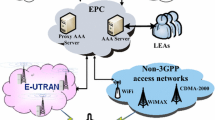Abstract
In this paper, we introduce a session key distribution mechanism for fast secure handover in wireless mobile networks. The proposed mechanism is based on the stream control transmission protocol in where a mobile node actively changes its IP address without its connection loss. When a mobile node moves between different access routers, the required session key at a new access router is distributed previously through the tunnel established between the previous access router and the new access router. Due to the reduced key distribution time, the mobile node achieves its secure seamless handover. The provided performance analysis proves that the proposed mechanism provides the reduced signaling cost compared to existing mobility protocols. In addition, the proposed mechanism reduces the handover latency so that the reduced amount of packet loss provides the stable handover performance for real-time applications.
Similar content being viewed by others
References
Johnson, D., Perkins, C., & Arkko, J. (2004). Mobility support in IPv6. RFC 3775, June 2004.
Koodli, R. (2005). Fast handovers for mobile IPv6. RFC 4068, July 2005.
Soliman, H., Castelluccia, C., El Malki, K., & Bellier, L. (2005). Hierarchical mobile IPv6 mobility management (HMIPv6). RFC 4140, August 2005.
Kim, H. G., & Choi, D. H. (2004). Session key exchange based on dynamic security association for mobile IP fast handoff. In Springer lecture notes in computer science, April 2004 (Vol. 3043, pp. 1151–1158). Berlin: Springer.
Stewart, R., Xie, Q., Morneault, K., Sharp, C., Schwarzbauer, H., Taylor, T., Rytina, I., Kalla, M., Zhang, L., & Paxson, V. (2000). Stream control transmission protocol. RFC 2960, October 2000.
Stone, J., Stewart, R., & Otis, D. (2002). Stream control transmission protocol (SCTP) checksum change. RFC 3309, September 2002.
Stewart, R. (2007). Stream control transmission protocol. RFC 4960, September 2007.
Stewart, R., Xie, Q., Tuexen, M., Maruyama, S., & Kozuka, M. (2007). Stream control transmission protocol dynamic address reconfiguration. RFC 5061, September 2007.
Koh, S. J., Chang, M. J., & Lee, M. (2004). mSCTP for soft handover in transport layer. IEEE Communications Letters, 8(3), 189–191.
Huang, C.-M., & Tsai, C.-H. (2007). The handover control mechanism for multi-path transmission using Stream Control Transmission Protocol (SCTP). Computer Communications, 30(17), 3239–3256.
Hasswa, A., Nasser, N., & Hassanein, H. (2005). Performance evaluation of a transport layer solution for seamless vertical mobility. In Proc. of international conference on wireless networks, communications and mobile computing (pp. 576–581). June 2005.
Zeadally, S., & Siddiqui, F. (2007). An empirical analysis of handoff performance for SIP, mobile IP, and SCTP protocols. Wireless Personal Communications, 43(2), 589–603.
Lopez, G., Canovas, O., Gomez, A. F., Jimenez, J. D., & Marin, R. (2007). A network access control approach based on the AAA architecture and authorization attributes. Journal of Network and Computer Applications, 30(3), 900–919.
Karopoulos, G., Kambourakis, G., & Gritzalis, S. (2007). Survey of secure handoff optimization schemes for multimedia services over all-IP wireless heterogeneous networks. IEEE Communications Surveys & Tutorials, 9(3), 18–28.
Koodli, R., & Perkins, C. E. (2001). Fast handover and context relocation in mobile networks. ACM SIGCOMM Computer Communication Review, 31, 37–47.
Kim, G., & Kim, C. (2004). Low-latency non-predictive handover scheme in mobile IPv6 environments. In Lecture notes in computer science (Vol. 3060, pp. 451–465). Berlin: Springer.
Thomoson, S., & Narten, T. (1998). IPv6 Stateless Address Autoconfiguration. RFC 2462, December 1998.
Han, Y., Choi, J., & Hwang, S. (2006). Reactive handover optimization in IPv6-based mobile networks. IEEE Journal on Selected Areas in Communications, 24(9), 1758–1772.
Rajavelsamy, R., Anand, S., Song, O., & Choi, S. (2007). A novel scheme for mobility management in heterogeneous wireless networks. Wireless Personal Communications, 43(3), 997–1018.
Author information
Authors and Affiliations
Corresponding author
Additional information
An erratum to this article can be found at http://dx.doi.org/10.1007/s11235-009-9237-y
Rights and permissions
About this article
Cite this article
Park, J.H., Jin, Q. Effective session key distribution for secure fast handover in mobile networks. Telecommun Syst 44, 97–107 (2010). https://doi.org/10.1007/s11235-009-9219-0
Published:
Issue Date:
DOI: https://doi.org/10.1007/s11235-009-9219-0




